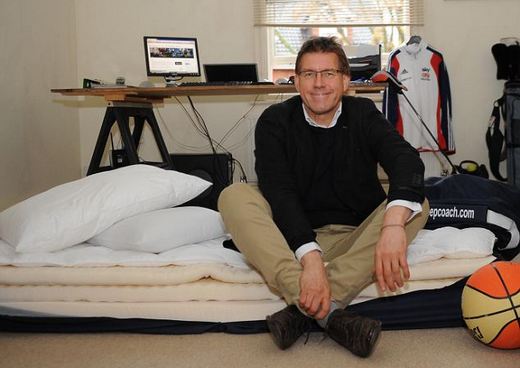News
Meet the sleep coach who helped Giggs, Terry, Drogba, Hoy and Wiggins

That Ryan Giggs is still playing in the Barclays Premier League in his 40th year is perhaps down to natural ability, a rigid conditioning programme and regular yoga.
The day the Manchester United midfielder invited a chap called Nick Littlehales round to his house in 2003 was maybe significant, too.
Littlehales is - as unusual as it sounds - an expert in the art of sleeping; how to do it and what to do it on and in.
He said this week: 'I was invited to talk to a group of United players. Six came to see me together. I spoke to them about how important it was to sleep in the right conditions on the right things.
'At the end, five walked out and one stayed and said, "I want to know more about this". It was Ryan Giggs.'
Giggs, whose longevity was threatened by hamstring problems as he reached the end of his 20s, is one of Littlehales' most famous clients. There are many more.
Most notable in football are Chelsea captain John Terry and his former team-mate Didier Drogba as well as the whole Blackburn squad during the days of Sam Allardyce.
Littlehales is acting as a consultant for United on a sleep room they are building at Carrington to cater for players returning from overseas games. He has also worked with Arsenal, Liverpool and for the Football Association.
His influence, though, is felt across other sports. In the summer, every member of the Team GB cycling team took individually designed, lightweight, fold-up mattresses and 'sleep packs' recommended by Littlehales into the Athletes' Village at the Olympics and slept on them on the floor next to their beds. They took his linen and duvets too. Bradley Wiggins and his colleagues at Team Sky took them up the mountains during the Tour de France.
So what's the big deal about sleep? Don't athletes count sheep like the rest of us?
'People don't understand how important it is and, more pertinently, how important it is to do right,' said Littlehales.
'If you are spending eight hours and more a day asleep, surely it makes sense to be in the right environment.
'To get it right you have to get things like temperature, light, noise and air quality correct. You have to know your allergies. Then, of course, you have to sleep on something that suits your height, shape and weight.
'I help athletes and people with injuries but it's not just that. It's preventative as much as anything. Many people walk into a shop, spend £500 on a posh mattress and walk out again. It's ridiculous.
'When you wake - athlete or not - you shouldn't want to turn over and sleep for another two hours. You should feel rested and ready to go. But how many people do? I dealt with one player whose bedroom temperature at home was 32 degrees! It was because his wife liked to be warm. He, meanwhile, was waking up dehydrated.
'That's quite common in sport. The partner chooses and designs the bedroom.'
Littlehales, a former professional golfer from the Midlands, was working for the Slumberland bed company in the 1990s when he heard about a back injury afflicting United defender Gary Pallister.
'I just wrote to Sir Alex Ferguson and said I may be able to help,' he recalled. 'Gary came to see me. He was travelling home from games on a special bed on the team bus. His back was that bad. At home he was sleeping in totally the wrong position.
'I didn't cure his injury but I did help him keep away from the physio's table. After that the United physios went and found out what every player was sleeping on. They even went into the lodgings of their youth players.'
Littlehales, who calls himself a sleep coach, has worked on and off with United for more than 15 years. He has even helped Ferguson.
Inevitably, there are those who don't have time for his theories. Steve Kean dispensed with him when he succeeded Allardyce at Blackburn two years ago, while his work with Chelsea ended when Carlo Ancelotti left.
He said: 'Certain managers won't buy into certain aspects of sport science. Most footballers will be sleeping in the wrong conditions. Allardyce, though, bought into the whole concept of marginal gains in sport very quickly.'
Littlehales has had an on-off relationship with the FA. Fabio Capello was one England manager who was not interested but others were.
'Before Euro 2004 we took the beds out of the England hotel and replaced them with my kits,' he said with a smile. 'The hotel staff thought the FA had gone bonkers.'
He has a meeting coming up about kitting out the FA's centre of excellence in Burton but it is work with Britain's triumphant cyclists that has made him most proud.
'Sir Chris Hoy set the example at the world championships and took one of my kits into his five-star hotel and slept on it,' Littlehales said. 'It only cost a few hundred quid. Then Bradley took his up the mountains.
'Hoy takes his "bed" with him everywhere. Once the others knew he was using it, they all followed.
'In the Athletes' Village they knew they had their own stuff and they understood the science behind it. They bought into it.
'Many football people think it's too much hassle to carry the stuff round. The cyclists don't.'
Littlehales' client list includes the Red Bull Formula One team, companies like Unilever and staff at the Victoria and Albert Museum. He also does consultations at people's homes.
He listened to the fuss about England's footballers taking sleeping tablets before their rearranged game in Poland in October with interest.
'You can't put caffeine into players during the day then try and suppress it at night with a sedative,' he said. 'You end up with players who are wiped out.'
l Nick Littlehales can be contacted at nick@sportsleepcoach.com


